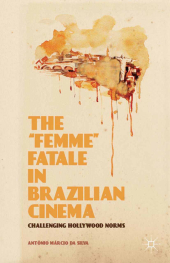 Neuerscheinungen 2014Stand: 2020-02-01 |
Schnellsuche
ISBN/Stichwort/Autor
|
Herderstraße 10
10625 Berlin
Tel.: 030 315 714 16
Fax 030 315 714 14
info@buchspektrum.de |

Antônio Márcio Da Silva, Antônio Márcio da Silva
(Beteiligte)
The "Femme" Fatale in Brazilian Cinema
Challenging Hollywood Norms
1st ed. 2014. 2014. vii, 215 S. 11 SW-Abb. 216 mm
Verlag/Jahr: SPRINGER PALGRAVE MACMILLAN 2014
ISBN: 1-349-48570-5 (1349485705)
Neue ISBN: 978-1-349-48570-3 (9781349485703)
Preis und Lieferzeit: Bitte klicken
In film, the femme fatale has long been constructed as a beautiful heterosexual Caucasian woman. Da Silva shows the need to incorporate diverse ethnic groups and male homosexuals into the range of "femmes" fatales and examines how the Brazilian representations cross gender, race, and class and offer alternatives to the dominant Hollywood model.
Introduction 1. The Black Femme Fatale in Xica da Silva 2. The Femme Fatale´s "Troubled" Gender in Madame SatÆ 3. Social Class and the Virgin/Whore Dichotomy in Bonitinha mas ordinária 4. The Fetish ´Dirt´ as ´Social Pollution´: The Married Femme Fatale in A dama do lota‡Æo 5. The ´Abject´ Lesbian Fatale in As intimidades de Analu e Fernanda 6. ´Quoting´ the Film-Noir Femme Fatale in A dama do Cine Shanghai Conclusion
´What is original about this study is da Silva´s decision to theorize the concept of the femme fatale, a term that has been very much of a shifter, in the sense that it has been moved around the semantic grid to cover multiple concepts or has been used to cover a gap in that grid. The ´Femme´ Fatale in Brazilian Cinema is attentive to the queer postulate that sociosexual categories are not fixed lexemes with a rigid hierarchy of sememes, but of gender in a society and its cultural production." - David William Foster, Regent´s Professor of Spanish, Women and Gender Studies, Arizona State University, USA
"This innovative book offers an interdisciplinary perspective on the performativity of the so-called ´femme fatale´ in a number of Brazilian films primarily from the 1970s and 1980s. Navigating between representations of the femme fatale, or the ´deadly woman´, if one prefers, as black, homosexual, slave or as a teenager, da Silva provides a key assessment of the figure for Lusophone Studies and cultural and film studies more generally." - Richard Cleminson, Reader, History of Sexuality, University of Leeds, UK
Antônio Márcio da Silva is Coordinator of Portuguese Studies at the University of Kent, UK.


